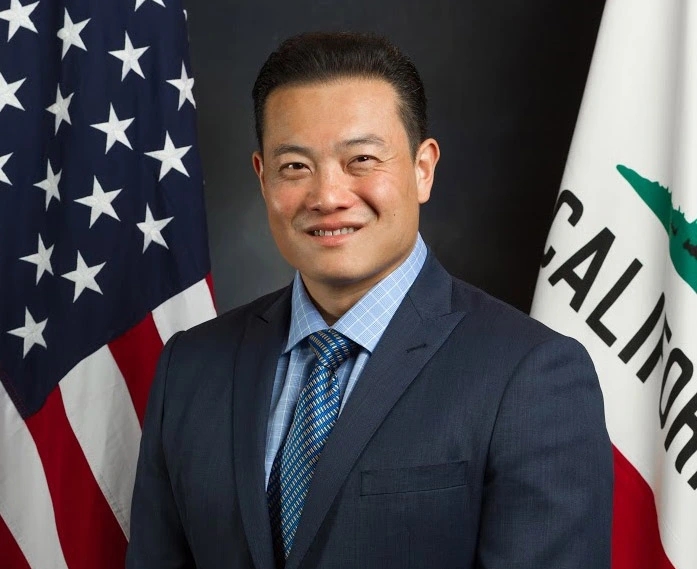
SACRAMENTO – The deadline has passed for candidates to file in the June 7 primary legislative races and, lo and behold, Phillip Chen, R-Brea, will run unopposed in the newly redrawn 59th Assembly District. Chen’s supporters see the lack of a challenger as a testament to the three-term lawmaker’s prowess. With the top-two system, this means he has no opponent in the general election, absent a late write-in opponent.
Not many Californians outside of that GOP-leaning district, which encompasses north Orange County and Chino Hills in San Bernardino County, know much about Chen. Nor do they have any reason to care about this particular race or what it means for a possible Republican resurgence. Yet Chen’s success offers this vital lesson for Republicans:
Selling out California’s hard-pressed taxpayers to the state’s muscular public-employee unions offers a surefire path to success. By contrast, politicians who stand up to those unions (especially the police and firefighter variety) will face well-funded challengers and get clobbered by hit mailers.
One need only look at John Moorlach of Costa Mesa. He spent his career focusing on pension and governmental reform and even supported a variety of police-accountability measures. That made him a union target. They used their war chest and slime campaigns to derail his 2020 Senate re-election and 2021 supervisor challenge.
Chen’s not quite the Lorena Gonzalez of the GOP, but he’s close. He co-authored a law that comes in second to the union-owned Gonzalez’s Assembly Bill 5 – the law that essentially outlawed independent contracting. Instead of forcing private companies to hire their contractors as permanent workers, it caused widespread job losses, thus prompting the Legislature and voters to carve out scores of exemptions.
Chen wisely voted no on that atrocity, but his bill with union-allied Assemblyman Patrick O’Donnell, D-Long Beach, was a gut kick to California cities that were trying to fix their pension problems while still maintaining quality firefighting and paramedic services.
Firefighting budgets consume 60 percent of city budgets. This leads to “crowd out” as these unsustainable costs require officials to slash other community services. California’s municipal firefighters earn average compensation above $200,000 and retire at age 50 with 90 percent of their pay. Many firefighters earn north of $400,000 annually.
Under the leadership of Mayor (now Riverside County supervisor) Jeff Hewitt, Calimesa exited its contract with Cal Fire and developed its own fire department. It provided excellent compensation, but by shifting to a 401/k retirement program it saved enough money to build a new fire station, add a truck and improve public service. The idea was picking up steam.
Cities have a declining number of options short of raising taxes or reducing services to deal with their unfunded liabilities. Most don’t even try given that unions often elect councilmembers. Some cities passed pension-reform ballot measures, but union lawsuits have overturned them because of the “California Rule” forbidding governments from reducing pensions even going forward.
But if cities create new departments they can remove employees from the California Public Employees’ Retirement System (CalPERS). Placentia saw an opportunity to save $28 million in a decade – a whopping amount for a small burb. Instead of spending money on six-figure pensions for retired employees, they could improve roads, parks and hire more police officers. Fancy that – a city putting the public above its employees.
Firefighter unions were livid and scared. They raised bogus safety fears and the state fire chiefs’ association called for a boycott of Placentia’s new department, but city officials ignored the intimidation and moved ahead. The fire unions then went to the Legislature, which – thanks in part to Chen’s sordid efforts – passed Assembly Bill 2967.
The law forbids “exclusions of groups of employees from being made by amendment of a public agency contract with PERS.” That’s technical language for forbidding cities from following the Placentia and Calimesa model. AB 2967 “simply makes clear that agencies electing to participate in the CalPERS system may not in the future amend the contract in a way that excludes a class of workers from CalPERS coverage,” the state firefighters’ union noted.
Related Articles
Free Leonard Peltier
American political discourse is poisoned by social media and hatred
Suspending the gas tax easier than Newsom’s plan
Can Arnold and Jerry save the world?
Biden Administration’s wrongheaded approach to freight trains
It was a devastating change. As the League of California Cities lamented, the law eliminates one of the “tools in the toolbox” for local governments that face higher costs and (at the time) lower revenues. It keeps them “from exploring novel and innovative operation structures in the future.” Whatever Chen’s overall voting record, his career will be defined by this gift to government unions – one that saddled cities with pension debt.
“Cities are looking for solutions and it shut the door on this one,” said Moorlach, one of only a few Republicans to oppose that bill. “It’s the dilemma we have in the Republican Party. There’s this pressure that happens to elected officials where getting re-elected is more important than good fiscal policy.” Sadly, the main takeaway from Chen’s “success” is to put good fiscal policy on the back burner.
Steven Greenhut is Western region director for the R Street Institute and a member of the Southern California News Group editorial board. Write to him at sgreenhut@rstreet.org.
